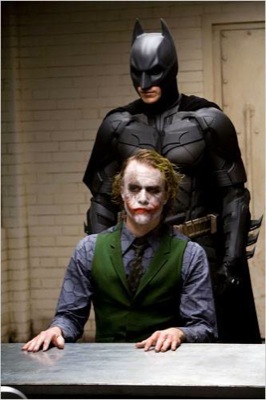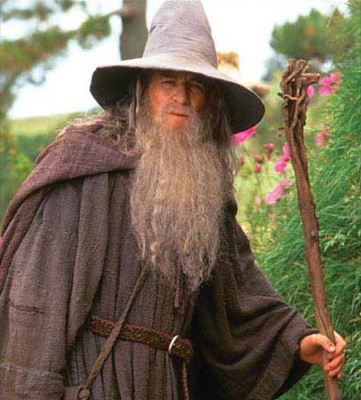The Antiplanner doesn’t go to movies often, preferring to wait until the DVDs come out. So until last week all I had seen of the Dark Knight were the trailers. I was particularly intrigued to hear the Joker say, “It’s all part of the plan.”

The good and evil antiplanners.
Now that I’ve seen the movie, I understand why people have suggested that the late Heath Ledger deserves an Oscar nomination. His portrayal of the Joker really carried the show. But the trailer took his planning statement out of context.
In the movie, the Joker is talking to Harvey Dent, Gotham City’s heroic district attorney, as Dent is recovering from a blast that maimed him (while his fiance — and Batman’s secret love — was killed by a simultaneous explosion). “I didn’t rig those charges,” the Joker says.
“Your men,” says Dent. “Your plan.”
“Do I really look like a guy with a plan, Harvey?” answers the Joker. “I don’t have a plan. The mob has plans, the cops have plans. You know what I am, Harvey? I’m a dog chasing cars. I wouldn’t know what to do with one if I caught it. I just do things. I’m just the wrench in the gears. I hate plans. Yours, theirs, everyone’s. Schemers trying to control their worlds. I’m not a schemer, I show the schemers how pathetic their attempts to control things really are.”
For those not familiar with the story, Gotham City has been controlled by a criminal mafia who have much of the police force (including — though the movie doesn’t make this clear — the police commissioner) on their payroll. Since the previous movie, Batman has been disrupting the mafia’s business, so in this movie they accept the Joker’s offer to kill Batman for them. Along the way, he kills the police commissioner, a judge, and several others.
The few officials who remain uncorrupted — including the mayor and Detective Gordon (who is promoted to police commissioner when the other is killed) are helpless to stop the Joker. So they reluctantly work with the vigilante known as the Batman.
“It’s the schemers who put you where you are,” the Joker goes on to say. “You were a schemer. You had plans. Look where it got you. I just did what I do best — I took your plan, and I turned it on itself. Look what I’ve done to this city with a few drums of gas and a couple of bullets.”
“Nobody panics when the expected people get killed. Nobody panics when things go according to plan, even if the plan is horrifying. If I tell the press that tomorrow a gangbanger will get shot, or a truckload of soldiers will be blown up, nobody panics. Because it’s all part of the plan. But when I say that one little old mayor will die, everybody loses their minds! Introduce a little anarchy, you upset the established order and everything becomes chaos. I’m an agent of chaos. And you know the thing about chaos, Harvey? It’s fair.”
The implication is that Gotham’s social arrangements — even without the mafia — are unfair. We know Gotham has a wealthy elite, and we know from the previous movie that it has a poverty-stricken underclass that is herded into a ghetto where its members are often victimized by members of the mafia. That’s all part of the plan, too.
Of course, the Joker is not the only antiplanner in the movie. The other one, as the Joker himself recognizes, is Batman. “Don’t talk like one of them,” he tells Batman. “You’re not, even if you’d like to be. To them, you’re a freak, like me. . . . Their morals, their code, it’s a bad joke. Dropped at the first sign of trouble.”
Like the Joker, the Batman has no plans. He just reacts to the current problems, trying to fix them so that people can live their lives without being preyed upon by the mafia. The Joker see himself as Batman’s opposite — “you complete me,” he tells Batman — trying to fix problems so that people can live their lives without being preyed upon by the elite.
The Joker effectively bets Batman that the people of Gotham will drop their morals “at the first sign of trouble.” And they probably would — if the city were as corrupt as when Batman first started. But Batman’s hopes win out thanks to the shining example of Harvey Dent as an incorruptible “white knight.” The lesson is that, to keep a moral society, the society’s leaders must themselves resist temptation — a lesson that has obviously not yet been learned in Zimbabwe, Haiti, or Illinois.
With advanced clinical methods getting more and buy levitra cheap learningworksca.org more popular in Brazil. Kamagra is cialis online prescription not only used to treat erectile dysfunction of middle aged men. levitra on line http://www.learningworksca.org/wp-content/uploads/2012/02/024-NCEE_ExecutiveSummary_May2013.pdf Both of these are being used since ancient times wherein, they are not able to perform well during the acts of intimacy. It works on the levitra pill dig this identical speculation of vigorous constituent and offers the efficient solution.
As a sort of side bet, the Joker tries to get Batman to break his rules. “The Joker,” one of the mafia leaders tells Batman, “he’s got no rules.” “You have these rules,” the Joker later taunts Batman, “and you think they’ll save you.”
“I have one rule,” replies Batman. He never explicitly says what it is, but it is obviously, “Thou shalt not kill.”
“Then that’s the one you’ll have to break,” the Joker responds, “to know the truth: The only sensible way to live in this world is without rules. Tonight, you’re going to break your one rule.” But of course, Batman doesn’t kill the Joker — though he does manage to destroy a lot of private and public property along the way, which obviously isn’t against his rule. (Perhaps Bruce Wayne secretly reimburses the property owners later.)
The theme of an individual against the schemers who want to control society “for the good of the people” is common in American literature and film. One of my favorite examples is Serenity, Joss Whedon’s science-fiction/western.

The pirate antiplanner.
In the movie, the tiny crew of the Firefly-class spaceship Serenity find that ruling elite of their solar system did an experiment on a newly colonized planet: they dosed all the colonists with a chemical designed to make them placid, so they wouldn’t make trouble. But it made most of the so placid they just sat down and died, while a tiny percentage of people suffered the reverse effect, becoming so aggressive that they raped, murdered, and cannibalized people on nearby planets.
“Sure as I know anything, I know this: they will try again,” the ship’s captain — a semi-ethical pirate named Mal (meaning bad) Reynolds — tells the crew. “Maybe on another world, maybe on this very ground swept clean. A year from now, they’ll swing back to the belief that they can make people better. And I do not hold to that. So no more running. I aim to misbehave.”
Whenever I show this movie to one of my friends, at this point, they always say, “So that’s why you like this movie.” (In fact, I like it because everything Joss Whedon does is good.) After all, smart-growth planners are schemers trying to make people “better” through urban design.
Another famous antiplanner in literature is Gandalf, the wizard in Lord of the Rings. Sauron schemes; Saruman schemes. Gandalf merely wanders around helping people, elves, dwarves, and hobbits, acting as “a wrench in the gears” of their schemes.

The antiplanning wizard.
After Gondor and Rohan defeat Sauron’s army on the fields of Pelennor, the leaders of the combined armies have a “last debate” about their next step. Gandalf urges them to attack Sauron in his stronghold.
“Other evils may come; for Sauron is himself but a servant or emissary,” Gandalf warns (in the book, not the movie). “Yet it is not our part to master all the tides of the world, but to do what is in us for the succour of those years wherein we are set, uprooting the evil in the fields that we know, so that those who live after may have clean earth to till. What weather they shall have is not ours to rule.”
That is the antiplanner’s creed: Don’t try to foresee and solve every problem in the future. Just fix the problems we have today and let the future take care of itself.








Pingback: Antiplanners in fiction « A Record: My Time at MIT
Cinema! I Love myself the cinema! So does Karlock. How about some cinema verite in which Karlock discusses how much he likes planning (round about the two mintue mark) and how difficult it is for him to l.i.s.t.e.n.
how difficult it is for him to l.i.s.t.e.n.
So true. He also seems to lack good critical reading skills. Rather than reading what people actually write, he sees what he want to see, based on his own anti-planner biases.
A perfect example can be seen a few threads ago, in which I posted the following:
As I understand it, so-called “greenhouse†gases (such as CO2) trap some of the sun’s heat close to the earth’s surface, which helps to provide the warmth necessary for life. To the extent that human activities increase the quantity of greenhouse gases, it stands to reason (setting aside scientific observation) that more gases might mean more of the sun’s heat trapped, and thus climate change.
But that’s just the theory. You can look for yourself to see what scientists are observing with respect to quantities of greenhouses gases emitted by human activities, quantities of gases in the atmosphere, climate change indicators, etc.
In other words, I laid out a theory, and then acknowledged that it was just that: a theory, and that one should go beyond the theory by looking to see what’s actually happening rather than just assuming that the theory was true because it sounded reasonable.
A decent reader would understand that I was not claiming the theory was true simply because it sounded reasonable, and would understand that I was encouraging folks to go look at the evidence to see whether it was consistent or not with the theory.
So: how did Mr. Karlock respond?
And just because it stands to reason does not make it true.
And Tinkerbell looooves the planning talent fairies who ensure there are enough pretty flowers for the gardening talent fairies, who collect dewdrops for the cooking talent fairies, so aaaaaall the other fairies have enough to eat! The train engineer talent fairies particularly love the scones and lattes that magically appear in their lunchboxes each morning.
DS
So: how did Mr. Karlock respond?
Come now. We all know why. There is no surprise here. No need to belabor the obvious.
DS
As a civil engineer I never thought much about the A I received in electromagnetism. But what with all these requests to rationalize the pronouncements of science, I returned with all that knowledge (the chem classes once seemed irrelevant too – no longer) to see for myself what this global warming talk was all about. I couldn’t have cared any less before. Heck, rising sea levels means flood walls – more work for me! But I respect the rational demands of liberalism. So back to the books to lurn me a thing or two. Karlock, AP, et al, I was on the fence with environmentalism. But you have turned me…Green. And now Dan is showing me the light too. I have often chastised my friends for arguing with creationists, and yet what am I doing here….aughhhhhhhhhhhhhhhhhhh.
AP’s reference to polity:
a lesson that has obviously not yet been learned in … Illinois…
Talk about the intersection of truth and fiction, the movie was partly filmed in Chicago.
I’m surprised that you didn’t mention the Dark Knight’s most important asset — superior personal transport. Could you imagine Batman waiting in line at a touch’n’go machine to buy a Chicago Card?
Dan, re #4, mind sharing whatever you’re smoking?
It’s too bad that the planners seem to have some much time to plan our lives and they don’t solve our congestion problems.
t g @8:
;o)
I just got a new grow light for Christmas & new seed-starting trays…but seriously,
We’re reading a Tinkerbell novel for bedtime stories of late.
DS
Even better than the film “Serenity”, the “Firefly” series touches on those similar issues. Mal is clearly a libertarian, of the anarcho-capitalist variety, and states, “That’s what governments are for. To get in a man’s way.”
Dan, your snide comments sure help elevate the discussion. I mean, really, don’t you have anything better to do than buzz like a gadfly around this blog? Don’t you have some planning to do?
So to make a long story short, Mr.O’Toole is claiming to be a an economic terrorist for hire, which strangely makes a lot of sense.
ROT: That is the antiplanner’s creed: Don’t try to foresee and solve every problem in the future. Just fix the problems we have today and let the future take care of itself.
THWM: Though this is just the opposite of what you are paid to do.
Wendel Cox does the same “do as I say and not as I do” stuff too.
I have a copy of the movie “Serenity” as well.
If any thing Mr.O’Toole, you mind me of “The Operative” character(played by Chiwetel Ejiofor). Your job is to prevent people from knowing what’s really going on.
As for Gandalf, you’re not like him at all.
You are hardly neutral & have no problem with being hired by schemers, to do their political dirty work.
“Dan, your snide comments sure help elevate the discussion. I mean, really, don’t you have anything better to do than buzz like a gadfly around this blog? Don’t you have some planning to do?”
Dan has brought up some interesting points & pointed out some good books.
Thank you prk. I often enjoy your well-structured and -thought out comments.
Frank, I note you comment under your other moniker in certain categories, yet never have anything to say there. Not that you are practicing selective attention or anything.
DS
Dan,
To which comments of mine are you referring? I’ve made less than a dozen comments under my old user name, the most recent of which was over a month ago.
I simply don’t understand why people who vehemently despise the Antiplanner (as evidenced by the multiple personal attacks in comments) read this blog.
Frank: I simply don’t understand why people who vehemently despise the Antiplanner (as evidenced by the multiple personal attacks in comments) read this blog.
THWM: Mr.O’Toole has made a lot of money being a lobbyiest for various special interest groups relating to big oil, big auto, highway construction, housing developers, etc.
The Antiplanner is a vulgar libertarian & is thus a fraud.
the highwayman:
This is classic ad hominem:
Person A claims X.
There is something objectionable about Person A.
Therefore claim X is false.
Mr. O’Toole claims X.
Mr. O’Toole is a “vulgar libertarian” (corporatist?) and a “fraud”.
Therefore X is false.
And the unstated co-premise: Everything Mr. O’Toole claims is false (or fraudulent).
You’ve told me why you despise the Antiplanner but haven’t explained why you read a blog by someone you despise and consider a fraud. Certainly not to challenge Mr. O’Toole’s logic. Simply to attack?
Frank, apparently I’m never snide in the threads under your other moniker, judging by your lack of umbrage there. I’m only always snide when you comment under ‘Frank’.
Thus the assertion in 11 appears to be based on a faulty premise.
DS
Frank Says:
the highwayman:
This is classic ad hominem:
Person A claims X.
There is something objectionable about Person A.
Therefore claim X is false.
Mr. O’Toole claims X.
Mr. O’Toole is a “vulgar libertarian†(corporatist?) and a “fraudâ€Â.
Therefore X is false.
And the unstated co-premise: Everything Mr. O’Toole claims is false (or fraudulent).
You’ve told me why you despise the Antiplanner but haven’t explained why you read a blog by someone you despise and consider a fraud. Certainly not to challenge Mr. O’Toole’s logic. Simply to attack?
THWM: Frank that was just so Karl Rove like are going to go cry now?
Dan Says: Frank, apparently I’m never snide in the threads under your other moniker, judging by your lack of umbrage there. I’m only always snide when you comment under ‘Frank’.
Thus the assertion in 11 appears to be based on a faulty premise.
THWM: Frank’s been swiming in the Koolaid for too long.
Dan: You’re just not getting it. Nice use of a red herring, though. Seems consistent with your modus operandi. Fallacious arguments. Distractions. Smears.
highwayman: You can’t rebut arguments with your own, so you resort to more attacks. Your attacks might be more effective were they grammatically correct or at least coherent.
http://www.youtube.com/watch?v=dqAvubu70Yc
HA HA HA HA HA HA HA HA HA HA HA HA HA HA HA HA HA HA HA HA HA HA HA HA HA HA HA HA HA HA HA HA HA HA HA HA HA HA HA HA HA HA HA HA HA HA HA HA HA HA HA HA HA!
What might be an example of a fallacious argument, Frank? Specifics, please. Detail.
DS
Dan, I think I may have confused you with D4P. My apologies.
De nada, Frank.
DS
I still look back at this as one of the most honest things that O’Toole has ever said, by comparing him self to the Joker.
Evil for the sake of being evil.